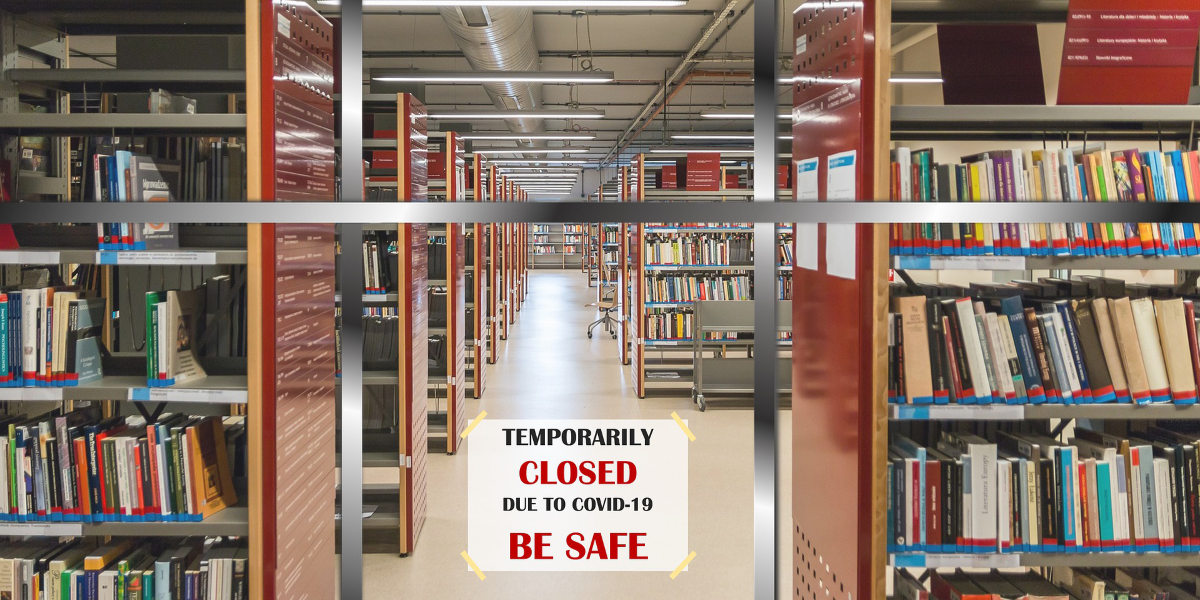Developed by LIS experts + 137 library staff across the nation innovating to serve their communities during COVID-19 and civic unrest.

For many libraries across the country, acting as a primary beacon of support during a crisis isn’t a new concept. Libraries and their communities have faced many devastating catastrophes, and in response offered facilities to provide shelter, internet access, food, and other emergency services. However, between March and April 2020 due to the emergence of the COVID-19 pandemic, public libraries were forced to close their buildings and halt many of their in-person programs and services indefinitely.
Once it became clear that returning to normalcy would take time, it was necessary for library administrators and staff to react by quickly making decisions on how to configure their programs and services. Libraries began launching virtual programming and on the ground services, such as grab-and-go and curbside book pick-up, but soon realized they were not prepared to handle the extended library building closures of 2020 into early 2021. Libraries were desperate to figure out the best way to reach their communities without access to the physical spaces and focus on thoroughly investigating the crisis-related needs of their local communities.
In response to these dilemmas, Dr. Mega Subramaniam, Associate Professor at the University of Maryland College of Information Studies (UMD iSchool) and Linda Braun, Learning Consultant at LEO, initiated the development of a comprehensive Field Guide designed to assist library administration and staff through these and other crises. The Guide is intended for use by all library staff of varying roles and levels of experience within the context of their own work.
Over the course of Summer 2020, there were seven virtual sessions held with 137 library staff nationwide to learn how they are supporting their communities during the COVID-19 pandemic. At the same time, the United States saw increased civic unrest and community activism resulting from the murders of George Floyd, Breonna Taylor, Ahmaud Arbery, Tony McDade, and Dion Johnson. With this reality in mind, the team’s work with library staff took on an expanded role focusing on library responses to the multiple crises facing the country.
The Field Guide opens with a call for public library staff to develop a mindset centered on community and public service – the “public servant mindset” – and to identify people within a community whom libraries can collaborate with to offer programs and services that are actually needed. By tapping into the expertise and knowledge of these individuals, also referred to as “community connectors,” members of the community will feel more inclined to engage with the library’s services because of the trust built through the community connectors.
One of the historical challenges library systems continue to face is the recruitment and retention of librarians of color, and while this was not the initial basis for the Field Guide, Subramaniam indicated her team realized during the virtual sessions that these community connectors who are characteristic representations of the people they serve and important cornerstones for building relationships within their communities.
“Even if [libraries] make the connections and act as the pillar that glues everything together, that itself is a collective impact that you can make to the entire community,” Subramaniam remarked. “This [Field Guide] describes the essential tasks for libraries to execute to reach the communities that they have not served before and serve the communities that need library services the most at this time.”
Additionally, due to the extended closures of libraries, the need for libraries and library staff has been questioned by various political leaders and decision makers. Some of the larger library systems have a great deal of bureaucracy built within them, which can impede library staff from freely communicating with their community and influences the amount of support given to library staff to conduct community outreach and design programs most vital in times of crisis. The Field Guide offers ways to document impact during a crisis, or even outside of a crisis, to demonstrate how libraries’ programs and services are successful through a collaborative assessment with the community and using feedback to make changes.
“Serving community during a crisis doesn’t require doing more, it requires doing different things. Consider using data to show your funders, decision makers, board members how you’re contributing to the community during crises, because if you can demonstrate the impact, no one is going to ask the question ‘why do we need you?’”
On March 23, the team will be hosting a webinar to introduce the Field Guide to attendees. To register, visit https://umd.zoom.us/.
Along with Subramaniam and Braun, the team is composed of S. Nisa Asgarali-Hoffman, PhD student and Keanu Jordan-Stovall, Academic Advisor at the UMD iSchool, and Dr. Christie Kodama, Assistant Professor in the Educational Technology and Literacy department within the College of Education at Towson University and iSchool PhD graduate.
# # #
Media Contact: Mia Hinckle, mhinckle@umd.edu
About the UMD College of Information Studies
Founded in 1965 and located just outside of Washington, D.C., the University of Maryland College of Information Studies (UMD iSchool) is a top-10 ranked research and teaching college in the field of information science. UMD iSchool faculty, staff and students are expanding the frontiers of how people access and use information and technology in an evolving world—in government, education, business, social media and more. The UMD iSchool is committed to using information and technology to empower individuals and communities, create opportunities, ensure equity and justice, and champion diversity.
About LEO
LEO is a company that specializes in developing learning experiences for informal and formal educational settings and in providing training and consulting to educational institutions. LEO works with clients across the country including public and school libraries, library consortia, colleges and universities, and public and private educational institutions.